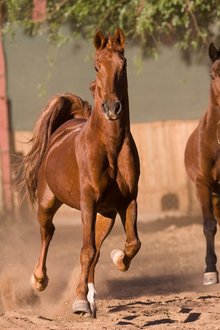With conditioning, shows, trail rides, parades, and other horse-related events, summer may be your busiest riding time. Keeping your horse sound for all this activity is partly related to taking good care of his hooves year-round.

Nutrition for sound equine feet
The nutrients needed for hoof growth are often contained in a horse’s normal diet, but adding a hoof supplement ensures that the horse has sufficient material to maximize development of strong hoof tissue.
© 2017 by Shutterstock.com
Feeding for sound equine feet, however, can’t be accomplished in a few weeks.
Good overall nutrition is the cornerstone of healthy hooves. Base the horse’s diet on high-quality forage, adding a fortified concentrate ration as needed to meet the energy demands of exercise.
If the horse doesn’t need the calories in a grain-based feed, provide vitamins and minerals by using a ration balancer pellet or a similar supplement.
The nutrients needed for hoof growth—usually biotin, methionine, and others—are often contained in a horse’s normal diet, but adding a hoof supplement ensures that the horse has sufficient material to maximize development of strong hoof tissue. For best results, use the supplement continuously in all seasons.
For horses that need a higher level of hoof-related nutrients, Kentucky Equine Research (KER) developed Bio•Bloom™ PS , a dual-action horse supplement designed to promote and maintain healthy skin, coat, and hoof condition from the inside out. Bio•Bloom PS contains biotin, methionine, iodine, and chelated zinc at levels shown to improve hoof growth, including development of strong hoof wall.
Bio•Bloom PS produces a soft, shiny coat and healthy growth of mane and tail, and includes essential amino acids and fatty acids for optimal coat condition.
During busy summer months, be sure to keep farrier visits on a regular basis, every four to six weeks for most horses. If shoes are loose or hooves need attention, don’t wait for the next appointment; contact your farrier and take care of the problem right away.
Finally, use hoof pads or boots if you do a lot of riding on hard or rocky ground, and watch for lameness caused by sole bruises or abscesses. Besides the wear and tear from increased summer riding, horses put a lot of strain on their legs and feet when they repeatedly stamp against hard ground to keep away flies.
Owners can help by using fly spray or leg nets. Moving air discourages flies, so providing a stall fan or allowing horses access to a breezy part of the field will also help.
Wondering if Bio•Bloom PS is right for your horse? Just share a few details here and a KER nutrition advisor will be in touch.
Kentucky Equine Research (KER) is an international equine nutrition, research and consultation company serving both the horse producer and the feed industry. Its goal is to advance the industry's knowledge of equine nutrition and exercise physiology and apply this knowledge to produce healthier, more athletic horses. For more information, see www.ker.com or call 888-873-1988.
